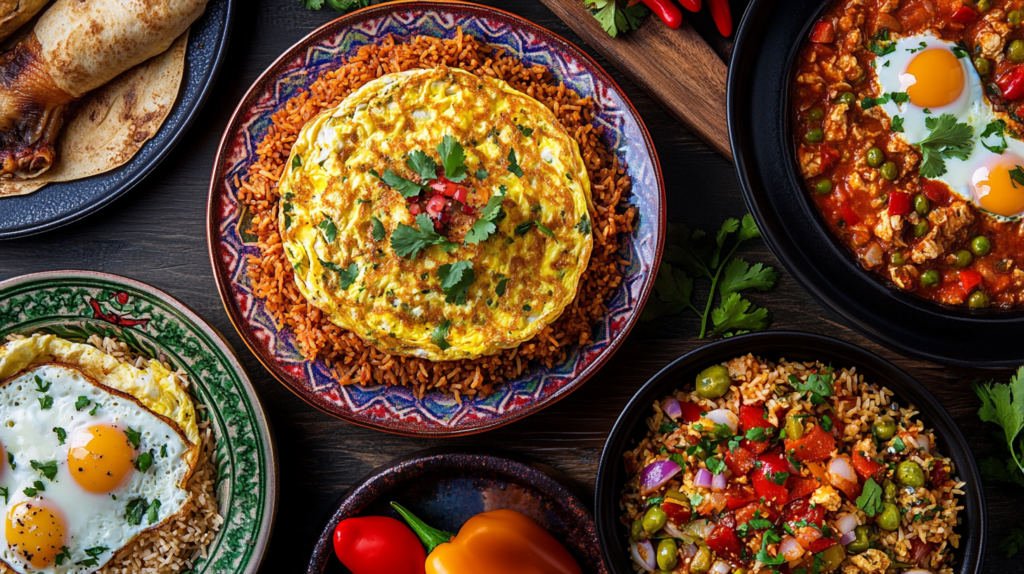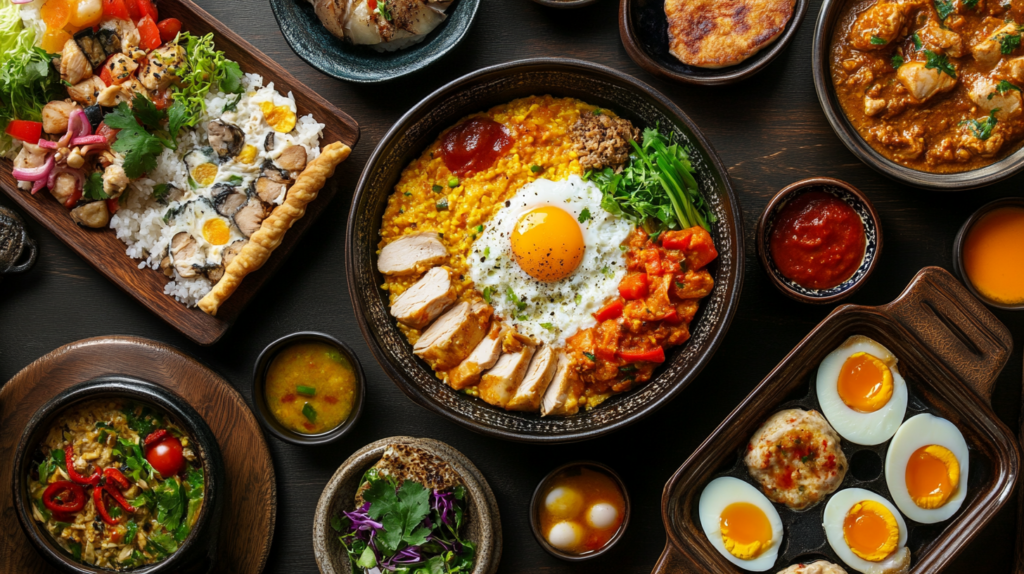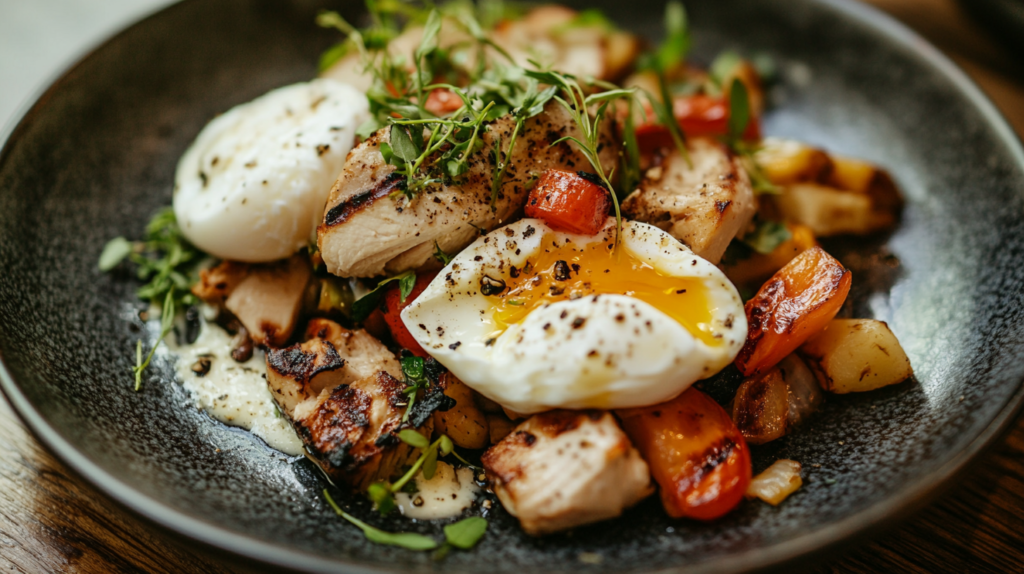Introduction
Eggs and chicken are staples in cuisines worldwide, each bringing unique textures, flavors, and nutrients to the table. Combining these two ingredients is not only common but also celebrated in a variety of dishes. From hearty breakfast scrambles to gourmet entrees, the pairing of egg and chicken has carved its niche in the culinary world.
This article delves into why egg and chicken work so well together, both nutritionally and gastronomically. It will explore their complementary roles in recipes, their shared benefits, and how different cultures elevate these ingredients in their cuisines. Whether you are a food enthusiast or a home chef, understanding the dynamics of this duo can unlock a new realm of cooking possibilities.
Nutritional Synergy
Protein Content Comparison
Egg and chicken are powerhouses of protein, making them a preferred choice for individuals focused on muscle building, weight management, or maintaining overall health. A single egg contains approximately 6 grams of high-quality protein, while 100 grams of chicken breast offers about 31 grams of lean protein. Combining these ingredients creates a meal rich in essential amino acids, which are crucial for tissue repair and growth.
Macronutrients
Beyond protein, egg and chicken provide complementary macronutrients. Eggs are an excellent source of healthy fats, particularly monounsaturated and polyunsaturated fats, which support heart health. Chicken breast, on the other hand, is low in fat and high in lean protein. Together, they balance macronutrient intake, offering energy and satiety without an overload of calories.
Health Benefits of Eating Eggs and Chicken Together
Pairing egg and chicken offers several health benefits:
- Enhanced Satiety: The combination of protein and fats slows digestion, keeping you fuller for longer.
- Nutrient Density: Eggs bring essential vitamins such as B12, D, and A, while chicken provides zinc and selenium. Together, they create a nutritionally robust meal.
- Support for Muscle Growth: The rich protein content supports muscle repair and recovery, making this pairing ideal for athletes and active individuals.
This nutritional synergy underscores why eggs and chicken are often combined in diets focused on health and performance.
Culinary Uses

Popular Dishes Combining Eggs and Chicken
Egg and chicken have a natural affinity in many popular dishes across the globe. Here are a few iconic examples:
- Chicken Omelette: A classic breakfast option where shredded chicken is folded into a fluffy egg omelette, seasoned with herbs and spices.
- Shakshuka with Chicken: A Middle Eastern-inspired dish where poached egg and spiced chicken chunks simmer in a rich tomato sauce.
- Fried Rice: A versatile Asian dish featuring stir-fried rice, scrambled egg, and diced chicken, often garnished with scallions and sesame oil.
- Chicken-Egg Curry: Popular in South Asia, this hearty dish combines boiled egg and chicken in a spiced curry sauce, served with rice or flatbread.
Regional Variations
Many regions have unique approaches to pairing eggs and chicken:
- Japanese Cuisine: “Oyakodon” is a comforting dish where chicken, eggs, and onions are simmered in a soy-based sauce and served over rice. The name translates to “parent and child bowl,” symbolizing the use of chicken and egg.
- Western Breakfast Platters: Scrambled eggs paired with grilled chicken or chicken sausages are a staple in many Western breakfasts.
- Latin American Cuisine: Chicken empanadas often include a hard-boiled egg filling for added richness and texture.
Cooking Techniques
The versatility of eggs and chicken allows for endless creativity in the kitchen. Common cooking techniques include:
- Scrambling: Combining diced chicken and whisked eggs in a skillet for a quick and protein-packed meal.
- Baking: Layering cooked chicken with egg and vegetables in a casserole for a hearty bake.
- Grilling and Topping: Grilled chicken breasts topped with poached eggs create an elegant and nutritious dish, especially when paired with a light hollandaise sauce.
The diversity in cooking styles ensures that egg and chicken remain a favorite combination for chefs and home cooks alike.
Flavor Profile
How Eggs and Chicken Complement Each Other
These two ingredients naturally complement each other thanks to their mild and versatile flavors. Poultry offers a savory, meaty taste, while eggs contribute richness and a creamy texture. This pairing works wonderfully as a base for a wide range of seasonings and accompaniments.
For instance, the subtle flavor of scrambled eggs pairs beautifully with the umami notes of grilled or roasted chicken. Similarly, a poached egg with a runny yolk enhances the moisture and flavor of dry chicken cuts, creating a harmonious blend of textures and tastes.
Enhancing Flavor through Seasoning and Pairings
The flavor synergy of eggs and chicken can be elevated through seasonings, sauces, and sides. Here are some ways to enhance their taste:
- Herbs and Spices: Add rosemary, thyme, or paprika for depth, or use cumin and coriander for a spiced profile.
- Sauces: A creamy béchamel sauce or tangy barbecue glaze can tie together egg and chicken components in a dish.
- Vegetables and Grains: Serve eggs and chicken with roasted vegetables, quinoa, or rice to add layers of flavor and texture.
Textural Harmony
The contrasting textures of these ingredients make them a delightful pairing. Soft scrambled eggs or creamy yolks complement the firmer bite of poultry, resulting in a satisfying culinary experience. Adding crunchy elements like toasted breadcrumbs or crispy skin can further enhance the dish.
This blend of flavors and textures ensures that eggs and chicken remain a versatile and delicious pairing suitable for a wide range of meals.
Versatility in Everyday Meals
Breakfast Options
Eggs and poultry make an excellent combination to kickstart your day. Try dishes such as a breakfast burrito filled with egg and shredded chicken or scrambled egg mixed with diced chicken and fresh spinach. These meals offer a protein-rich start to fuel your morning.
Lunch Ideas
For lunch, chicken salads topped with boiled egg or chicken and egg sandwiches are satisfying and easy to prepare. Incorporating fresh vegetables and whole grains further enhances these meals’ nutritional profiles.
Dinner Favorites
Eggs and poultry are great for hearty dinners, such as a baked casserole layered with shredded meat, cheese, and a creamy egg mixture. Stir-fries with scrambled eggs and tender pieces served over rice or noodles are also quick and flavorful options.
Snack and Appetizer Options
Deviled egg with a chicken filling or mini chicken and egg sliders are excellent snack ideas for gatherings or casual meals. These small bites are both nutritious and delicious, making them crowd-pleasers.
Health Considerations
Dietary Restrictions
While eggs and chicken are highly nutritious, they may not suit everyone. People with specific dietary restrictions or preferences should consider the following:
- Allergies: Egg allergies are relatively common, particularly in children, though they often outgrow them. Chicken allergies, while rare, can also occur. Individuals with these allergies should avoid dishes combining these ingredients.
- Dietary Choices: Vegans and vegetarians typically exclude eggs and chicken from their diets. However, vegetarians who consume eggs may benefit from ovo-vegetarian recipes.
- Cholesterol Concerns: Eggs, particularly the yolks, are high in cholesterol. While research suggests that dietary cholesterol has minimal impact on most people’s blood cholesterol levels, individuals with pre-existing heart conditions should consult their healthcare provider.
Food Safety Tips for Cooking Chicken and Eggs
Proper handling and cooking of chicken and eggs are essential to avoid foodborne illnesses. Here are some safety practices:
- Cooking Temperatures: Cook chicken to an internal temperature of 165°F (75°C) to eliminate harmful bacteria like Salmonella. Eggs should be cooked until the whites and yolks are firm, especially for vulnerable populations like children and the elderly.
- Separate Storage: Store chicken and eggs separately in the refrigerator to prevent cross-contamination. Use sealed containers for raw chicken to avoid leakage.
- Hygiene: Wash hands, utensils, and surfaces thoroughly after handling raw chicken and eggs.
- Freshness: Use fresh eggs and properly refrigerated chicken to ensure quality and safety. Check expiration dates and inspect for any spoilage signs.
Balanced Consumption
Though eggs and chicken are nutritious, moderation is key. Overconsumption of either ingredient, particularly fried or processed versions, can lead to excessive calorie intake or health concerns. A balanced diet incorporating diverse food groups is essential for long-term health.
By keeping these considerations in mind, individuals can enjoy the benefits of eggs and chicken while minimizing potential risks.
Cultural Significance

Historical Context of Eggs and Chicken in Global Cuisines
Eggs and chicken have been integral to human diets for centuries, playing prominent roles in culinary traditions across the globe. Domesticated thousands of years ago, chickens were valued for both their meat and eggs, which provided accessible and affordable protein.
In ancient Egypt, eggs were considered a symbol of fertility and renewal, often incorporated into religious ceremonies and festive meals. Similarly, in Chinese culture, egg and chicken feature prominently in traditional dishes like “red egg” served during celebrations such as weddings or the birth of a child.
Festive Dishes and Traditions
Eggs and chicken are central to many festive and celebratory meals, with cultural significance tied to specific events:
- Western Easter Traditions: Egg symbolize rebirth and renewal, while roast chicken is often part of holiday feasts.
- Indian Festivals: Dishes like chicken biryani and egg curries are frequently prepared for special occasions and family gatherings.
- Japanese Celebrations: “Oyakodon” is a comforting dish often enjoyed during family celebrations, reflecting the deep cultural connection to food symbolism.
Modern-Day Culinary Fusion
The globalization of food has led to the creative fusion of egg and chicken in contemporary dishes. Chefs worldwide experiment with unique flavor combinations, blending ingredients and techniques from various cultures. For example:
- Korean Fried Chicken with Egg Toppings: Crispy chicken is paired with sunny-side-up eggs or incorporated into rice bowls.
- Mexican-Inspired Breakfast Tacos: Scrambled eggs, shredded chicken, and fresh salsa wrapped in tortillas.
- European-Inspired Quiches: Chicken and eggs combined with cheese and vegetables in a flaky crust, merging tradition with modern flair.
The enduring cultural relevance of eggs and chicken showcases their versatility and universal appeal, cementing their place in culinary history.
FAQs
Is it safe to eat eggs and chicken together?
Yes, it is safe to enjoy eggs and poultry together as long as both are cooked thoroughly to prevent foodborne illnesses. Ensure the meat reaches an internal temperature of 165°F (75°C), and eggs are fully cooked, especially for vulnerable populations.
Are egg and chicken good for weight loss?
Yes, eggs and chicken are excellent choices for weight loss due to their high protein content, which promotes satiety. For optimal results, consider lean chicken cuts and use minimal added fats during preparation. For more insight into incorporating chicken into morning meals, check out Is it good to eat chicken for breakfast?.
Can egg and chicken be part of a healthy breakfast?
Absolutely! Eggs and chicken create a nutritious breakfast option, offering essential protein and energy to start your day. Some ideas include omelets with shredded chicken, breakfast burritos, or scrambled eggs paired with tender pieces of meat. Explore other innovative morning recipes in Chicken Breakfast Recipes.
What spices work well with eggs and chicken?
Spices like paprika, cumin, turmeric, black pepper, and garlic powder complement eggs and chicken. Fresh herbs like parsley, cilantro, and dill also enhance their flavors.
Can vegetarians eat eggs and chicken?
Vegetarians who include eggs in their diet (ovo-vegetarians) can consume egg-based dishes but typically avoid chicken. Vegans, however, exclude both eggs and chicken.
What are some quick recipes with egg and chicken?
Some quick recipes include chicken omelets, chicken and egg fried rice, or a grilled chicken salad topped with a poached egg for added richness and flavor.
Conclusion
Eggs and chicken are a dynamic culinary duo, celebrated for their complementary flavors, nutritional benefits, and versatility. From traditional recipes to modern fusion dishes, they offer countless opportunities for creativity in the kitchen. By understanding their flavor profiles, health considerations, and cultural significance, home cooks and food enthusiasts can fully appreciate the value of combining these ingredients.
Whether you’re crafting a quick breakfast or preparing a festive meal, this duo delivers satisfaction and a connection to global culinary traditions. Explore the endless opportunities with eggs and chicken to create delicious and nutritious meals for any time of day. For more culinary inspiration, visit What to Serve With Rotisserie Chicken or Top Traeger Recipes for Perfect Grilling and Smoking.

